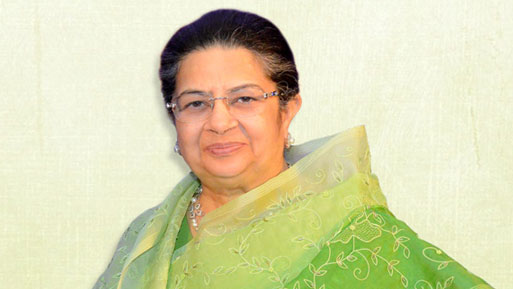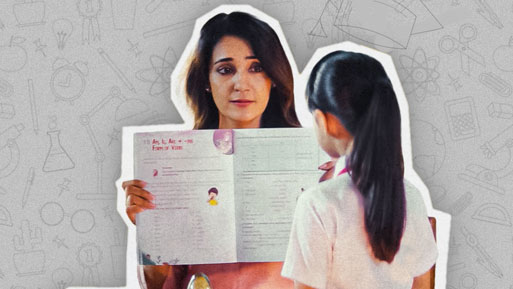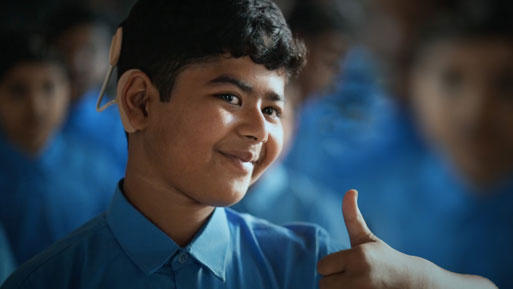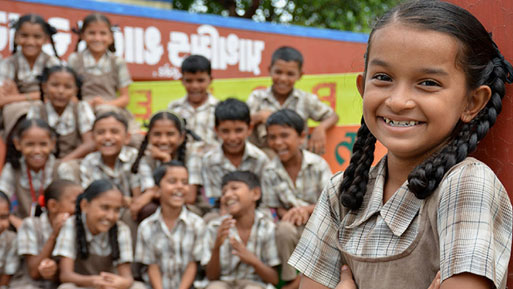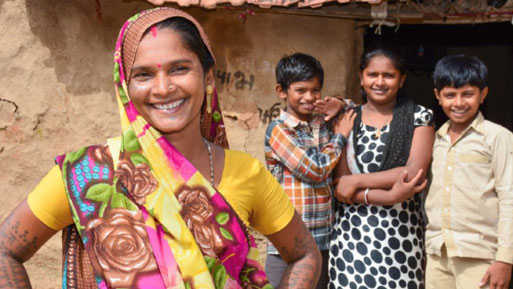Rajashree Birla: A protagonist of change
01 October, 2015
ShareAn interview with Padma Bushan winner Rajashree Birla, Chairperson of the Aditya Birla Centre for Community Initiatives and Rural Development
Hello!
Rajashree Birla, Chairperson of the Aditya Birla Centre for Community Initiatives and Rural Development — the Padma Bushan winner (for her services to society) is a tireless protagonist of change... Her efforts have resulted in a movement across the country to eradicate poverty, foster education and stimulate employment within a sustainable environment
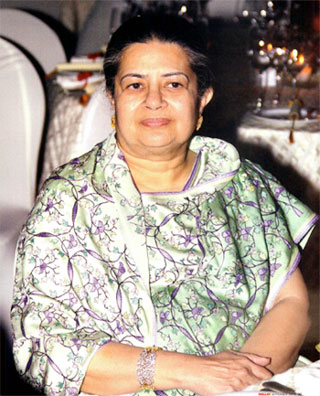
How did it all begin?
When I was a child of 10 and I used to see small children living on the roads, I always would dream of setting up a children''s home, when I grew up. So I think, somewhere at the back of my mind, there was this predominant sense of service - and it all came to fruition in my early 30s. Let me share with you, just how prescient this was. India, our nation, is a land of paradoxes... here you can see extremities, far beyond one''s imagination.
So it is not uncommon to find millions of children out of school, even though we have made our mark on the intellectual map of the world. It is not uncommon to see children stretching their palms out for alms. It is not uncommon to have little boys and girls at traffic signals, selling newspapers, magazines, a string of flowers, or shining shoes at kerbs. Delve into their lives and one discovers that most of them have migrated from the villages, they try to eke out a living from the streets, and make the pavement their home... this has been a recurrent story over the ages and continues till date.
The first step
From the early 1970s, seized by this concern, Shankar Rao Chavan, the then Chief Minister of Maharashtra, brainstormed on plausible solutions of this problem, with Adityaji; (Birla). For him, Adityaji was a humanitarian par excellence. A visionary, he could be depended upon to help the Chief Minister mitigate this issue of destitute children taking to begging. The Chief Minister had a lofty vision of abolishing begging in Bombay (now Mumbai) and parts of Maharashtra.
For destitute children and juveniles to be looked after - therefore, a Rehabilitation Centre seemed an imperative. Together, Adityaji and Chavan, blue-printed a strategy of building a home for children. But this home needed to bring a new meaning to the lives of these unfortunate kids. Their goal was for these children to never return to the streets and never be reduced once again to begging, but instead, be self-reliant. To do so, they would be trained in a vocation that best suited their aptitude... a vocation that would help them secure employment and live their lives as responsible working citizens. Based on this ideology, Adityaji backed by the Government, spawned ''Mangal Mandir,'' a new abode for destitute children in 1979. It was rechristened, a decade ago as ''The Aditya Birla Centre for the Welfare of Children.''
Today
From 1979 to date, we have managed to reach out to 3,000 boys. Every year, 200 boys are trained at our orphanage. What is most rewarding is that more than 95 per cent of these boys have found jobs or are involved in small enterprise start-ups. For all of them, the years spent at the centre have been memorable and a great learning experience. Several of them are still in touch with us. Our giving has made, and continues to make, a huge positive difference to the lives of these children. This home for children is a dream come true!
Your inspirations
Here, I must add that I am extremely blessed to have been born to parents who embedded in us values such as respect, integrity and caring for others; not being selfish and self-centred. And being a part of the Birla family has been a singular blessing. My grandfather-in-law, Shri Ghanshyam Dasji Birla was deeply influenced by Mahatma Gandhi. Pujya Dadoji as we called him, imbibed the trusteeship concept from Gandhi. The larger good of society was always uppermost. From Gandhiji and Dadoji, we learnt that we have a tremendous responsibility to give back to society. And this strain of thought has been embedded in every generation of our family. So the spirit of giving and caring is part of our DNA.
After Adityaji's untimely demise in 1995, Kumar Mangalam suggested that I look after a few units. Very quickly, I realised that I was not cut out for business, and I told him so. Then a year down the line (1997), we set up the ''Aditya Birla Centre for Community Initiatives and Rural Development,'' which I spearhead. The Centre is anchored by our Group Executive President, Communications and CSR, with a team of 250 professionals, supported by a 2,000 strong ground force.
The work
All of our CSR projects are structured and are very meaningful. We have an articulated CSR Vision - ''To actively contribute, to the social and economic development of the communities in which we operate. In so doing, build a better, sustainable way of life for the weaker sections of society.'' In a nutshell, it epitomises inclusive growth and dignifying the lives of the underprivileged. We have a holistic approach and we work in the areas of education, healthcare, sustainable livelihood, infrastructure support and social reform. We work in 5,000 villages globally, reaching out to 7.5 million people annually.
In healthcare
- Over a million patients are treated, at 4,500 Medical Camps and our 18 hospitals.
- 22 million children have been immunised against polio over the last five years. We are now working with Rotary International and the Government's Health Department to ensure the non-resurgence of polio.
- Endeavours towards open defecation-free villages have resulted in over 8,000 toilets, partly leveraging Government schemes for the social sector.
In education
- At 12 schools across India, quality education is provided to 45,000 children. Of these, 18,000 students belong to the underprivileged segment and are first generation learners. On the anvil are four more schools. Merit Scholarships are given to 24,000 children from the interiors of the country. Over 28,000 children in the hinterland of India are being taught conversational English to build their confidence.
- Over 2.5 lakh school children (Grade V to XII) in 18 remote areas of Madhya Pradesh and Rajasthan are being provided with solar lamps.
- The midday meal kitchen in the Keonjhar district of Odisha is organised facilitating the provision of midday meals to 208 schools, along with the transport facilities. Going forward this year, we are sponsoring midday meals of 50,201 children across 200 schools spanning Lucknow, Jaipur and Ahmedabad.
Towards sustainable livelihood
- Our Vocational Training Centres and the Aditya Birla Rural Technology Park accord training in sustainable livelihood projects to 80,000 people.
- Our 4,500 Self-Help Groups have led to the empowerment of 45,000 women.
- Working closely with Habitat for Humanity, we have so far built more than 500 houses as part of our community outreach programme besides supporting the building of an additional 3,800 houses across India.
Towards model villages
We are also engaged in creating model villages in rural India. We have chosen 300 villages for this transformation where by in a five year timeframe, the villages would be self-reliant in every aspect, moving out of the ''below the poverty line'' status. So far more than 90 villages in India''s hinterland, have already reached the level of model villages.
The big picture
The aim is to embed CSR as a way of life in organisations. We have set up the FICCI Aditya Birla CSR Centre for Excellence, in Delhi. In line with our commitment to sustainable development, we have partnered with Columbia University in establishing the Columbia Global Centre''s Earth Institute in Mumbai. Ongoing education, healthcare and sustainable livelihood projects in the Philippines, Thailand, Indonesia, Egypt, Korea and Brazil are being carried out in order to lift thousands of people out of poverty.
We transcend the conventional boundaries of business because we care. I find that our work in communities and my involvement has endowed my life with a sense of purpose. And it elevates what I do to a spiritual level. I feel closer to my maker through our selfless service. Within me there is peace and tranquillity. I also want to confess that, all this has been only possible because of the tremendous encouragement given by Kumar Mangalam.
He has helped institutionalise processes. He has made the social vision an integral part of the business vision. Consequently our Centre is like a parallel organisation within the group. He always says, ''As we voyage into a sensational future, we must find it within ourselves to look beyond ourselves. It is the responsibility of every generation to leave behind a safer, superior, more enlightened world than the one that they inherit''. The teachings of the Buddha tell us that thousands of candles can be lit from a single candle, and yet the life of that candle will not be shortened.
In summary
CSR in our Group is rooted in a rich past and I humbly add, that it is moving towards a promising future. I believe that we truly practice compassionate capitalism. Service to society is at the very heart of our value system. Our dream for India is an India of inclusive growth... an India where every person realises his/her optimal potential... an India where every human being lives a life of dignity... an India that can hold her head high in the hegemony of nations. And we must all present leaders, and leaders in the making walk this talk with a sense of urgency. Together, we can make this India''s destiny!
Text by Farah Palia


